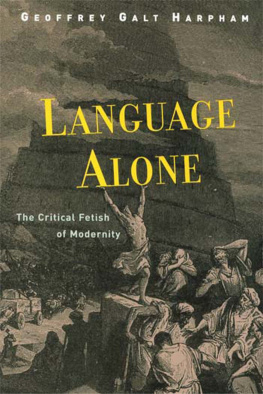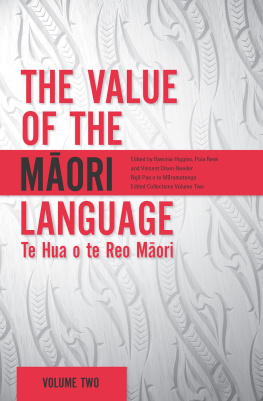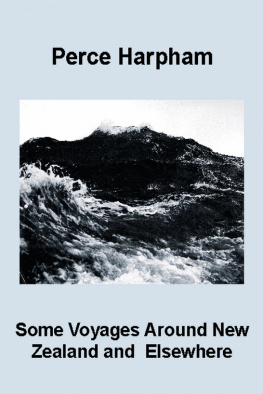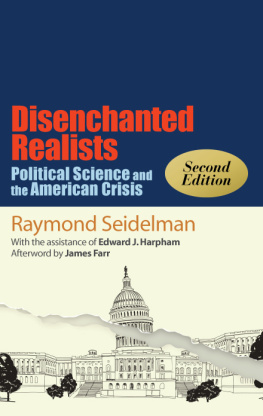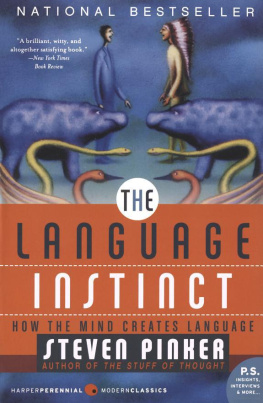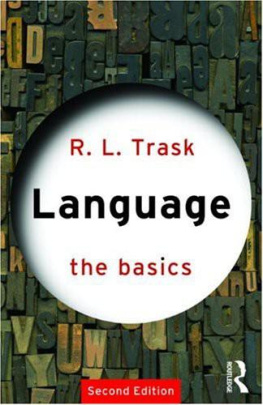Harpham - Language Alone
Here you can read online Harpham - Language Alone full text of the book (entire story) in english for free. Download pdf and epub, get meaning, cover and reviews about this ebook. publisher: Taylor & Francis (CAM), genre: Home and family. Description of the work, (preface) as well as reviews are available. Best literature library LitArk.com created for fans of good reading and offers a wide selection of genres:
Romance novel
Science fiction
Adventure
Detective
Science
History
Home and family
Prose
Art
Politics
Computer
Non-fiction
Religion
Business
Children
Humor
Choose a favorite category and find really read worthwhile books. Enjoy immersion in the world of imagination, feel the emotions of the characters or learn something new for yourself, make an fascinating discovery.
- Book:Language Alone
- Author:
- Publisher:Taylor & Francis (CAM)
- Genre:
- Rating:4 / 5
- Favourites:Add to favourites
- Your mark:
- 80
- 1
- 2
- 3
- 4
- 5
Language Alone: summary, description and annotation
We offer to read an annotation, description, summary or preface (depends on what the author of the book "Language Alone" wrote himself). If you haven't found the necessary information about the book — write in the comments, we will try to find it.
Harpham: author's other books
Who wrote Language Alone? Find out the surname, the name of the author of the book and a list of all author's works by series.
Language Alone — read online for free the complete book (whole text) full work
Below is the text of the book, divided by pages. System saving the place of the last page read, allows you to conveniently read the book "Language Alone" online for free, without having to search again every time where you left off. Put a bookmark, and you can go to the page where you finished reading at any time.
Font size:
Interval:
Bookmark:
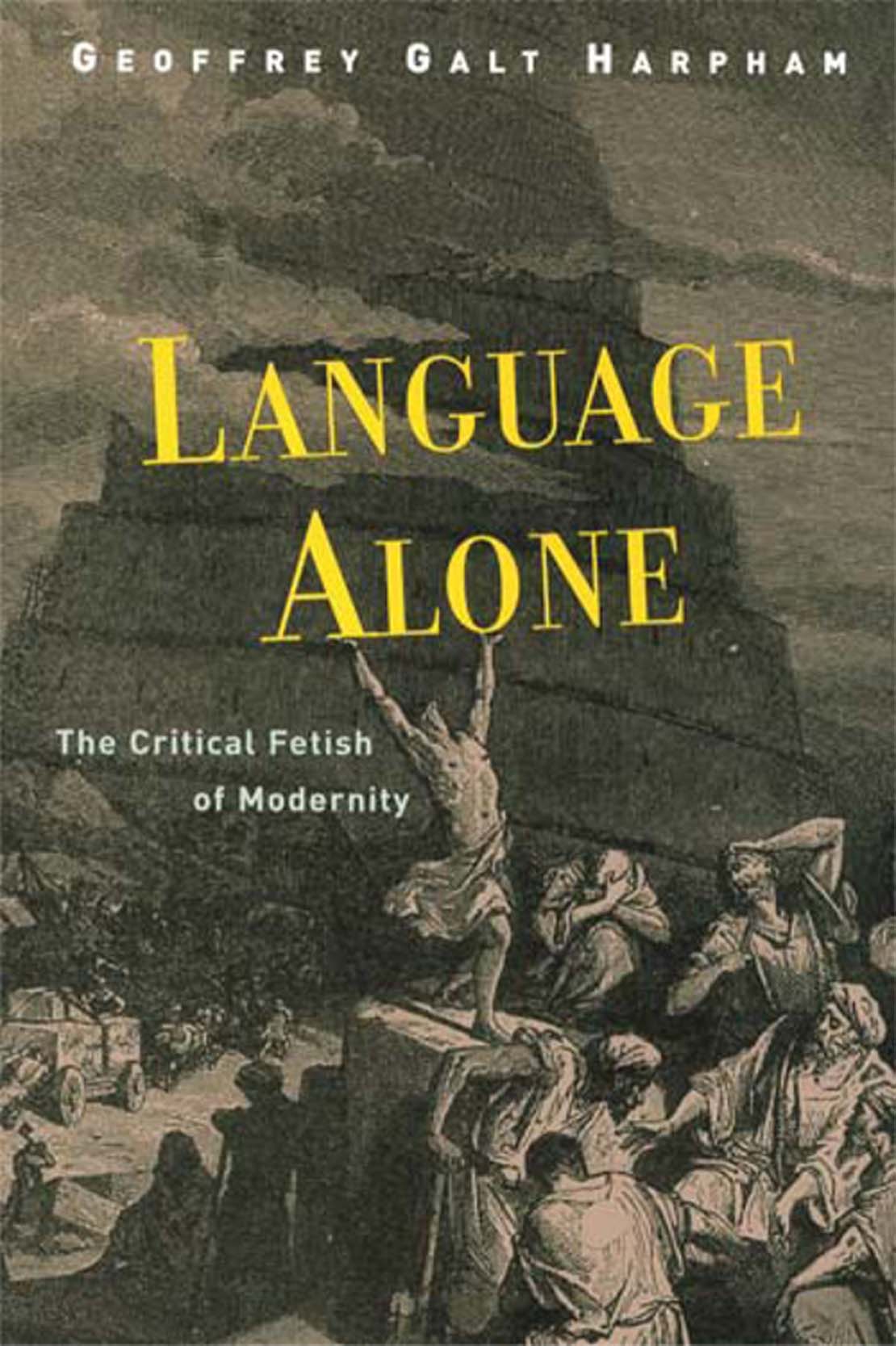
B OOKS BY G EOFFREY G ALT H ARPHAM
On the Grotesque: Strategies of Contradiction
in Art and Literature
The Ascetic Imperative in Culture and Criticism
Getting It Right: Language, Literature, and Ethics
One of Us: The Mastery of Joseph Conrad
Shadows of Ethics: Criticism and the Just Society
A LONE
of Modernity

First Published in 2002 by
Routledge
This edition published 2013 by
Routledge
711 Third Avenue New York, NY 10017
2 Park Square Milton Park, Abingdon, Oxon OX14 4RN
Copyright 2002 by Routledge
Routledge is an imprint of the Taylor & Francis Group, an informa business.
All rights reserved. No part of this book may be reprinted or reproduced or utilized in
any form or by any electronic, mechanical or other means, now known or hereafter
invented, including photocopying and recording or in any information storage or retrieval
system, without permission in writing from the publisher.
Library of Congress Cataloging-in-Publication Data
Harpham, Geoffrey Galt, 1946
Language alone : the critical fetish of modernity / Geoffrey Galt Harpham.
p. cm.
Includes bibliographical references and index.
ISBN 0-415-94218-7 (hbk) ISBN 0-415-94219-5 (pbk.: alk. paper)
1. Language and languagesPhilosophy. I. Title.
P107.H37 2002
401dc21 | 2002024904 |
To my mother, Mardel Harpham,
who always has an opinion
T his book has two purposes, one modest and service-oriented and the other critical. The first is to provide a guide to the roles played in critical thinking of the past century by the concept of language, by which I mean not languages in particular but language in general, language as such, language itself, language alone. Many of the defining intellectual debates in the past century have relied on this concept, and I try to show how, why, and to what effect.
What I will call the thought of language centers theoretical or general linguistics, with its scientific aspirations and ethos, and has informed as well the working premises of other fields, including psychoanalysis, philosophy, structural anthropology, political theory, and literary theory. Over the past century, these other discourses have sought to ground or anchor themselves in the thought of language, especially as that thought was developed by Ferdinand de Saussure. They have made theoretical progress by referring, and deferring, to language as if it were a solved problem, a stable and determined entity, even while claiming on occasion to have undermined the concept of determinate knowledge itself. Two of these theoretical discourses, concerning ethics and ideology, are treated at length here.
The second, less modest purpose of the book is to critique the thought of language by exposing the limitations of language as an object of knowledge. Nothing meaningful, I argue, can be said about language as such, both because language as such is not available for direct observation and because the features, aspects, characteristics, and qualities that can be attributed to language approach the infinite. Language is inadequate as an object of knowledge both because there is too little information available, and because there is too much. Somewhere in the vast domain of the linguistic can be found tokens of virtually anything at all, including order, arbitrariness, social cohesion, individual creativity, rationality, freedom, the unconscious, excess, nature, cultureanything. This is why all characterizations of the essence or true nature of language are tendentious, but it is also why the thought of language has been able to serve so effectively as a proxy for other thoughts, a way of addressing recurrent questions about human life that have become difficult to address directly in a posthumanistic and rationalist climate.
If the thought of language stands in for concerns that cannot, for some reason, be addressed directly, then it should, in principle, be possible to determine what those concerns are, and so usher in a new era of honesty or directness. But we should not be too quick to embrace a principle of literality that, if realized, would put an end to speculative inquiry and to the vivifying sense of progress that has long provided the best excuse for our faltering and imperfect efforts to lead the examined life. Instead, we should perhaps try to appreciate the real productivity of indirection and surrogacy, the dynamism of false consciousness; we should try, that is, to find a way to live without the direct apprehension of truth even as we seek nothing less and nothing else.
There is nothing in the real world corresponding to language. In fact it could very well turn out that there is no intelligible notion of language... the notion language might turn out just to be a useless notion.
N OAM C HOMSKY , The Generative Enterprise
It may be that What is a language? is held to be a question to which some academic discipline, e.g. linguistics, is trying to give a definitive answer. But that would not automatically make it a genuine question.
R OY H ARRIS, The Language Makers
It may even be in the cards that there is no such thing as Language (with a capital L) at all!
B ENJAMIN L EE W HORF, Language, Thought, and Reality
There is no such thing as a language.
D ONALD D AVIDSON, "A Nice Derangement of Epitaphs
I f the cultural and intellectual life of a century could be expressed in a sentence, then a leading candidate for that honor, as far as the twentieth century in the West is concerned, is the following from Wittgensteins Philosophical Investigations: And to imagine a language means to imagine a form of life(1997: I 19: 8). Widely quoted and variously construed, this sentence suggests many things, among them the possibility that cultural forms may be inferred from language because the properties of a given language contain the cultures essential structures of feeling, its collective sensibility, the intelligible form of its otherwise inchoate character, the tools with which it constructs its sense of things in general. So paraphrased, Wittgenstein seems to be making the pragmatic recommendation that we might study a language as a way into a particular culture, on the premise that an understanding of the one will lead to an understanding of the other.
But as readers of the entire Philosophical Investigations, rather than just this sentence, know, Wittgenstein has already said just the opposite. Language, he has been arguing in this passage, is a far more problematic concept than we would like to believe. The accounts of it that have been proposed have, he suggests, typically falsified the subject by reducing it to a few principles, even to a single essence, when there are, in fact, many different operations, varieties of usage, kinds of linguistic units. When we look closely at language, we see not simplicity but a warren of interlaced elements, codes, and levels, and mysterious horizons beyond which it cannot venture. Our confidence that we understand language is utterly misplaced; in fact, language is the site of a massive confusion. As he says later, we do not
Font size:
Interval:
Bookmark:
Similar books «Language Alone»
Look at similar books to Language Alone. We have selected literature similar in name and meaning in the hope of providing readers with more options to find new, interesting, not yet read works.
Discussion, reviews of the book Language Alone and just readers' own opinions. Leave your comments, write what you think about the work, its meaning or the main characters. Specify what exactly you liked and what you didn't like, and why you think so.

